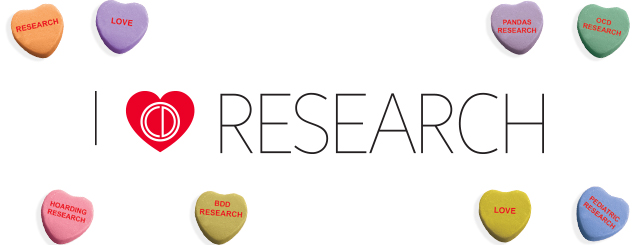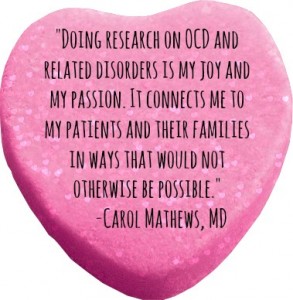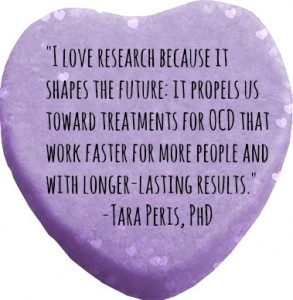Love is in the air this time of year, and here in the IOCDF offices, we’re celebrating Valentine’s Day by talking about why we love research!
Each year, the International OCD Foundation rewards research grants to the most promising research focused on OCD and related disorders. Since the IOCDF’s inception 30 years ago, we have seen tremendous progress in how OCD is diagnosed and treated thanks to research, and many of the most significant findings have been the result of research funded by the IOCDF Research Grant Fund. These grants are funded through the generosity of individual donors — individuals like you.
This is why, starting today, we are asking you to tell us why you love research and to support our new I ♥ Research campaign to help grow the IOCDF Research Grant Fund. With your help, we can achieve our goal of raising $10,000 this week in support of research into the causes of and effective treatments for OCD and related disorders.
Click Here To Donate
Why Do You ♥ Research?
Recently, I asked several researchers who have had their work funded by the IOCDF Research Grant Fund, as well as donors who have contributed to the fund, to share with us why they ♥ research:
Doing research on OCD and related disorders is my joy and my passion. It connects me to my patients and their families in ways that would not otherwise be possible. Helping to identify the causes of these disorders, working to design better treatments, and understanding the brain mechanisms underlying them — all of it makes what I do clinically that much more valuable.
—Carol Mathews, MD, Pre-Eminent Professor, Department of Psychiatry at the University of Florida“I love clinical research because of its enormous power to so positively influence the lives of countless individuals suffering with mental illness. Quality research, however, requires considerable resources and in recent years, large funding agencies have progressively restricted their support for mental health research and studies that can inform best practices in mental health care. This is particularly the case for the funding of research on low base rate disorders, such as OCD. Amidst this increasingly concerning funding climate, the IOCDF stands alone in its continued (and increased!) support of research focused on improving the treatment and lives of individuals with OCD and reducing the stigma associated with mental health issues.”
—Jonathan S. Comer, PhD, Mental Health Interventions and Technology (MINT) Program, Center for Children and Families and Florida International University
“We believe that giving to the IOCDF Research Grant Fund is just the right thing to do. While we also support awareness and education programs, our real passion is helping to find a cure for OCD!”
—Jean & family, Los Angeles, CA“In psychiatry, as in all medicine, research is the tool that informs action. The quality and content of services available to patients and their families is shaped by the results of investigations — like those supported by the International OCD Foundation — which work to uncover the nature and causes of these disorders, while using this knowledge to improve treatment and support for individuals impacted directly or indirectly by these conditions. The grants offered by the IOCDF are furthermore unique in their provision of support for young researchers — a group that may offer fresh ideas for responding to patient needs, but whose junior status can limit opportunities for pursuing independent research. As a recent post-doc at the time of my grant award, I was grateful for the support of the IOCDF.”
—Ashley Nordsletten, PhD, Karolinska Institutet“As an evidence-based practitioner, I rely upon clinical research to inform my patient care. Indeed, my funding from the IOCDF provided me with a phenomenal opportunity to identify the psychosocial factors that place youth at greater risk for the development of OCD. It is my hope that the results of this project can be used to inform the development of an efficacious prevention program to alter children’s developmental path. Without funding from foundational grants such as the IOCDF, I would not have been able to pursue this area of research and disseminate my findings to the psychiatric community.”
—Noah Chase Berman, PhD, OCD and Related Disorders Program, Massachusetts General Hospital and Harvard Medical School, Department of Psychiatry“I support research into the causes and cures for OCD because I believe we are on the brink of major breakthroughs that will change the way mental health issues are diagnosed and treated for generations to come. I donate for my daughter and my future grandchildren — and for all the children with OCD. It’s time to make a stand for those who suffer invisibly from often debilitating health issues.”
—Susan, North Carolina“I love research because it makes a difference in people’s lives. I’ve been fortunate to receive funding from IOCDF that has helped me understand factors that interfere with treatment success for children with OCD and what might be done to address them. It’s been deeply meaningful to me to see children and families benefit directly from this work through better treatment response and improved quality of life. Along these lines, I love research because it shapes the future: it propels us toward treatments for OCD that work faster for more people and with longer-lasting results.”
—Tara Peris, PhD, UCLA Semel InstituteI love research because it has a clear and meaningful impact on improving the well-being of those suffering from mental illness. I love research because it has revolutionized the way treatment for OCD is conducted and without it, we would not understand why or how it works. Members and donors of the IOCDF should love research because the amount of research that can be done to study OCD has a direct relationship with the development of more effective treatments for OCD.
—Angela Fang, PhD, Massachusetts General Hospital/Harvard Medical School
As I read these comment from researchers who are committing their life’s work toward discovering a cure for OCD, I found words that seemed to jump off the page — words like passion, cure, cause, commitment, and future. For me, these words embody the meaning of research. Research means HOPE — the expectation and desire for something to happen. If we have research, then there is hope that one day, we will find a cure for OCD and related disorders. The only way we will continue to have this hope, though, is if we keep our commitment to funding this valuable research.
Your donation to the I ♥ Research Campaign is investing in hope for a child living with OCD — hope that one day, we will know exactly what causes OCD, and we will know the best way to deliver treatment so lives are not interrupted. As an added benefit to support the I ♥ Research Campaign, a generous longtime donor to the IOCDF has agreed to match all NEW research donations dollar for dollar. If you are a first time donor, they will match your gift 100 percent. If you have already given to the fund, they will match any increase in your gift over what you gave last year.

As a small token of our appreciation for your support of the I ♥ Research campaign, you can opt to receive one of the following gifts to show your family and friends that you ♥ research!
- Anyone who makes a gift will receive an I ♥ Research bumper sticker.
- If you make a gift of $25 or more, you will receive an I ♥ Research tote bag.
- If you make a gift of $50 or more, you will receive an I ♥ Research coffee mug.
This Valentine’s Day, give the gift of HOPE with a donation to the IOCDF Grant Research Fund by clicking here. Once you donate, don’t forget to tell us why YOU love research by leaving a comment below or sharing with your friends and followers on Facebook or Twitter. Make sure to use the hashtag #IHeartResearch!




I ❤ research because it opens the door for hope and change for people like myself that suffer greatly from OCD. I’m 24 years old and I have had OCD since appox the age of 6. I went untreated untill this last July. Everyday I hope that one day there will be more resources available in my hometown for people that suffer from OCD. Which is exactly why I became an OCDvocate to lower the stigma and bring up the challenges that not only OCD suffers struggle with but the whole mental health spectrum. Which can only be done with more research, awareness, and a greater since of self and community! I defiantly ❤❤? research! I will be searching this on my twitter, my facebook and all my groups!